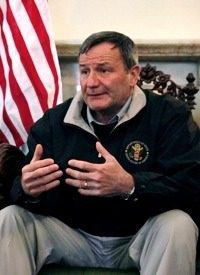
In a January 26 report, the New York Times revealed newly obtained additional details from transcripts of diplomatic cables sent by U.S. Ambassador to Afghanistan Karl W. Eikenberry to his superiors last November, in which he warned about the inadequacies of Afghan President Hamid Karzai and took a position against the U.S. troop buildup favored by Gen. Stanley A. McChrystal, the commander of U.S. and NATO forces in Afghanistan.
The newspaper noted that An American official provided a copy of the cables to the Times after a reporter requested them. In his cables, Eikenberry warned that Karzai “is not an adequate strategic partner” and “continues to shun responsibility for any sovereign burden.”
An article in the Times for November 12, 2009 noted:
General Eikenberry sent his reservations to Washington in a cable last week, the officials said. In that same period, President Obama and his national security advisers have begun examining an option that would send relatively few troops to Afghanistan, about 10,000 to 15,000, with most designated as trainers for the Afghan security forces.
In “Obama to Consider Four Afghan Troop Options,” our report for The New American online published on November 12, 2009, we quoted from an AP report that Ambassador Eikenberry was “voicing strong dissent about a U.S. troop increase, according to a second administration official."
We also quoted from the the Washington Post that Eikenberry “sent two classified cables to Washington in the past week expressing deep concerns about sending more U.S. troops to Afghanistan until President Hamid Karzai’s government demonstrates that it is willing to tackle the corruption and mismanagement that has fueled the Taliban’s rise. Eikenberry’s memos, sent as President Obama enters the final stages of his deliberations over a new Afghanistan strategy, illustrated both the difficulty of the decision and the deepening divisions within the administration’s national security team.”
Though the essence of Eikenberry’s objections to the troop increase recommended by Gen. McChrystal was made public last November, the more complete text just made available to the Times revealed “for the first time,” in the journalist’s words, “just how strongly the current ambassador felt about the leadership of the Afghan government, the state of its military and the chances that a troop buildup would actually hurt the war effort by making the Karzai government too dependent on the United States.”
Among the most pointed of Eikenberry’s criticisms of President Karzai was one quoted from his cable of November 6:
Karzai continues to shun responsibility for any sovereign burden, whether defense, governance or development. He and much of his circle do not want the U.S. to leave and are only too happy to see us invest further. They assume we covet their territory for a never-ending "war on terror" and for military bases to use against surrounding powers.
Eikenberry concluded another cable on November 9 by warning “that we will become more deeply engaged here with no way to extricate ourselves, short of allowing the country to descend again into lawlessness and chaos.”
An editorial writer observed in the British Guardian for January 26 that once President Obama made his decision to approve the troop request by Gen. McChrystal last December, Eikenberry’s objections ceased and he said during testimony given on December 8, while seated next to McChrystal, "I am unequivocally in support of this mission.”
Since McChrystal, Eikenberry, and Defense Secretary Robert Gates are all members of the internationalist Council on Foreign Relations, Eikenberry’s eventual acquiescence to the party line was inevitable, since such conformity is undoubtedly a prerequisite for his tenure in his position.
As the Guardian commentator noted, however:
Eikenberry’s distancing of himself from his previously strongly held views, either out of loyalty to Obama or for fear of losing his job, does not mean those views are invalid or irrelevant, then or now. Two diplomatic cables authored by Eikenberry last November and published in full today for the first time raise fundamental questions about US and NATO strategy that remain germane, disquieting, and largely unresolved.
President Karzai did not remain silent amidst the fanfare created by these latest revelations. While attending a regional gathering in Istanbul, he told reporters on January 26: "Afghanistan is on the frontline of the war on terror" in a struggle which has cost "massive casualties."
He went on: "If partnership means submission to the American will, then, of course, it’s not going to be the case. But if partnership means cooperation between two sovereign countries, one of course very poor and the other very rich,… then we are partners."
Karzai — along with Secretary of State Hillary Clinton — will attend a 65-nation conference in London starting on January 28, the goal of which is to find ways to bring stability to both Afghanistan and adjacent Pakistan.
For almost as long as the U.S. military has been in Afghanistan, opponents of the deployment have warned that there was a very real possibility that our nation would become endlessly bogged down in a Vietnam-type no-win war. The passage of time makes those warnings ever-more legitimate.
Photo of Ambassador Eikenberry: AP Images



